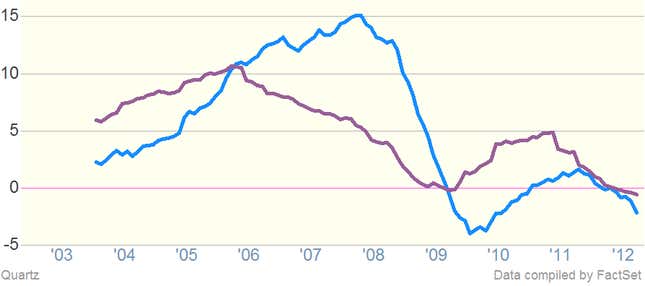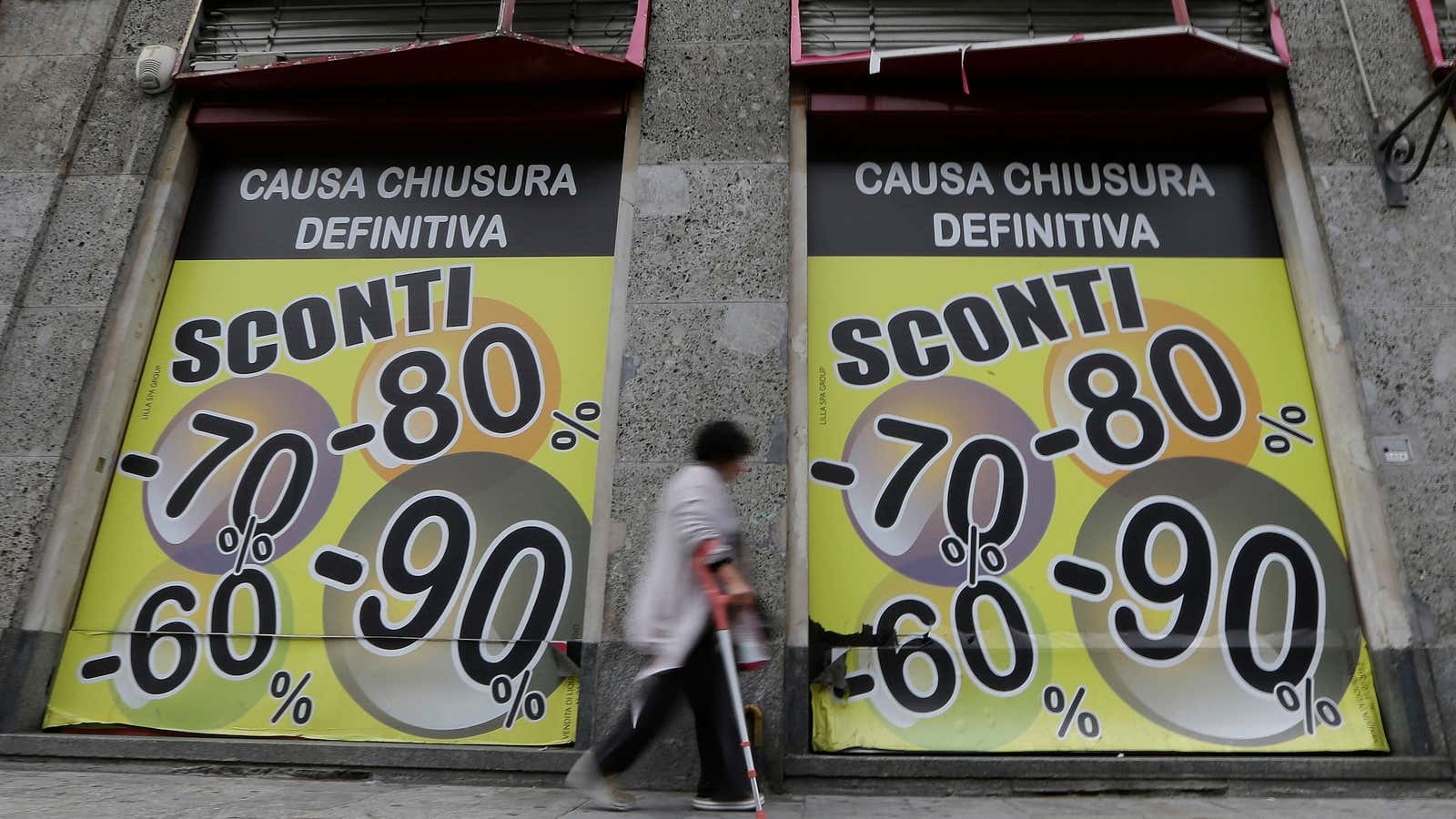The European crisis has left most euro-watchers scared about two things: governments and banks. Foreign investors are fleeing governments that are on the brink of insolvency, fearing a replay of the Greek default that happened earlier this year. They also fear banks, which not only hold a lot of this sovereign debt, but also hold the debt of businesses and people in struggling economies who are now beginning to go broke. But as the crisis drags on and European leaders repeatedly wait to step in and “save Europe” at the last moment, a new reality is dawning: brinkmanship and delays could produce a far more severe recession than European leaders have been predicting.
This time last year, the Italian and Spanish governments flirted with illiquidity; interest in owning Italian and Spanish bonds all but dried up. Banks suspected of having high exposures to the PIIGS (Portugal, Ireland, Italy, Greece, and Spain) faced similar funding pressures, and there was fear that they would not be able to roll over their debts. Since banks are the largest purchasers of their countries’ sovereign debts, that translated back to higher costs of issuing government debt, creating a vicious circle. This took Europe to the edge of the precipice, with two of its largest economies barely able to fund themselves and the entire European banking system—especially the French banks—begging for life support.

The European Central Bank (ECB) pulled the continent back from the brink by extending long-term loans to banks at extremely low rates for three years. But EU leaders shoved it forward again when they bickered over a Greek default in March and a Spanish bank bailout in June.
Now the same movie is being replayed. Investors fear that Spain needs a bailout but won’t get one until it’s too late, and that Italy won’t be far behind. Greece dances around default once again, as EU leaders stall on disbursing its next round of aid. And all the signs suggest that the German economy, Europe’s powerhouse, is finally slowing down.
Over and over again, European leaders have proved they will do the minimum necessary to keep the euro zone functioning. That does not, however, mean it’s functioning well. Approximately one in four Greeks and Spaniards are unemployed, and there’s little sign that they will find jobs anytime soon. European companies in all but the most stable economies are having trouble finding funding. Meanwhile, banks are hoarding cash to meet new, stricter capital requirements and show EU regulators that they’re not at risk of failing.
Tight credit markets and declining demand for goods and services have created the perfect recipe for the real euro crisis: years and years of economic downturn amid protracted uncertainty. If companies can’t get funding to survive, they’ll lay off workers and close factories, further exacerbating the drop in demand for goods and services. More and more companies will face default if they can’t get financing to roll over their debt, bolstering that drop in demand.
This isn’t a future development; it’s already happening. Spanish Economy Minister Luis de Guindos lamented on Nov. 12th that Spanish small and medium enterprises (SMEs) are paying twice as much (link in Spanish) as German companies are paying to borrow. Some corporations have run into so much difficulty finding affordable funding that they’ve simply stopped borrowing: Portuguese construction company Faustino e Ferreira decided to keep its business smaller rather than pay 8% to borrow on the open market. Big businesses are selling off limbs to save the core: The likes of Banco Santander, Telefónica, Iberdrola, and both the Italian and Greek governments have been periodically putting their overseas and non-core assets on the block in attempts to raise capital. But the trouble is likely to be most acute for small businesses seeking to grow— that is, inherently risky prospects that would ideally form the backbone of a wave of growth in Italy, Spain, and even France, but are increasingly being rejected for loans by banks that just can’t stomach the risk.
This will be a slow, painful death. It will be a back-and-forth in sentiment as European leaders deliver on some promises but forego others. ”The risk-reward characteristics of the European corporate bond market will be increasingly scrutinized for signs of a bubble and the onset of a rotation into equities,” writes Fitch analyst Michael Larsson. Ultimately, these loan problems could even creep into bigger corporates, particularly if Spain and Italy suddenly find themselves downgraded and on aid programs.
Not that there won’t be investment. American, Chinese, and even other emerging-market investors have been sitting on their hands as the uncertainty in Europe unfolds. Ultimately, companies could become so desperate for funding that private equity shops and larger corporations could pick up assets in Europe for a bargain. The problem is that we’re not there yet. Those investors can afford to pick and choose cheap, distressed assets in countries like the UK and Germany. In the meantime, some SMEs will go under. Others will downsize dramatically, leaving more workers out of work.
Thus the most probable result of the European crisis is not that the whole union falls apart. It’s what happens while Europe is saving itself: a broad, deep-set recession that will only inflame popular anger and make the crisis even more difficult to recover from.
